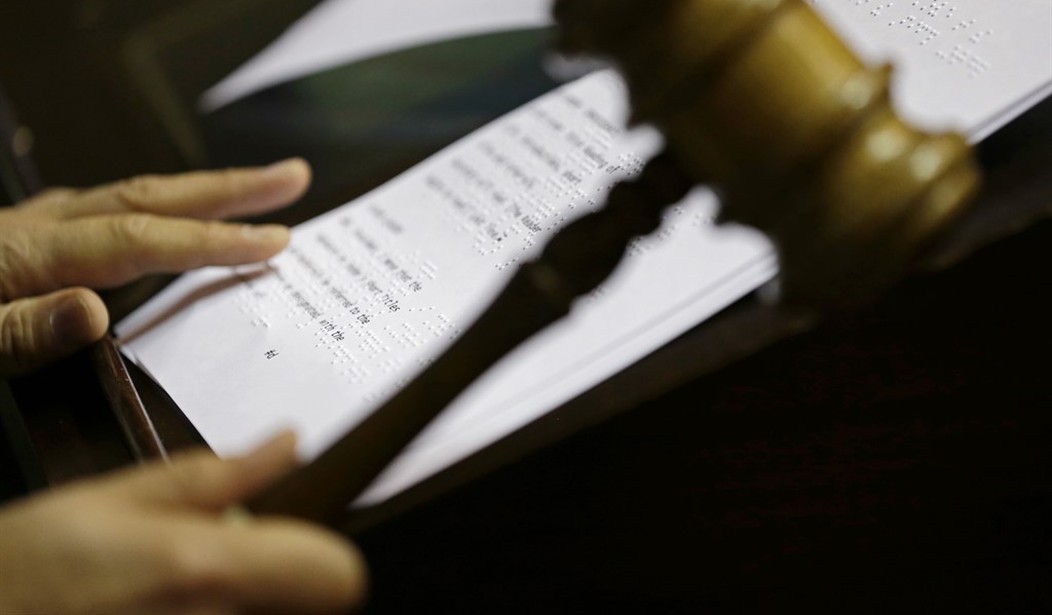In many ways, President Donald Trump’s border fight is a battle on two fronts; one at the border with Mexico, and the other in the federal court system. Reports of violence against U.S. Border Agents at our southern border with Mexico should remind us that securing the border is a fundamental responsibility of the President. To at least some left-leaning federal judges, however, that responsibility is so unimportant that they have attempted to tie both of Trump’s arms behind his back as he tries to gain control of the chaos down south. It is fast reaching the point at which a fundamental decision must be made; one with profound consequences: who runs our country, the president or the unelected judges?
The spark igniting this constitutional fire may very well be upon us if President Trump closes the border with Mexico, in the face of an imminent threat of a horde of non-citizens pressing to cross into our country unlawfully, and keeps it shut down until Mexico deals with the problem on its side of the border. If a federal judge is then found who is more sympathetic to improving the quality of life for citizens of other countries than to reaffirming the authority of an American president to protect our constitutional Republic, and enjoins Trump from thus acting, we will have to confront the question that worried our Founding Fathers – are there any limits to what judges can decree?
As constitutional conservatives, our default position is, and should be, that we are a “nation of laws not of men”; a sentiment dating back to 1803’s Marbury v. Madison opinion by Chief Justice John Marshall. It is a position that protects citizens from unlawful conduct of government, and is the backbone to the system of checks and balances undergirded by the U.S. Constitution. This would seem especially relevant in the context of securing the border, an exercise which is the most basic element of sovereignty and national security.
Recommended
But, with federal courts now reflexively inserting themselves into the day-to-day governance of our country, particularly directing their ire at this president, we as a nation have to answer the question of just how far judicial authority extends, and whether a president is allowed do anything without approval of the federal courts.
It would not be surprising, and certainly within Trump’s personality, to take the same tack as President Andrew Jackson did in 1832; defying a Supreme Court decision (also delivered by Marshall) with regard to the forced migration of Cherokee Indians from Georgia to Oklahoma (the “Trail of Tears”). Jackson is said to have grumbled, “John Marshall has made his decision; now let him enforce it!” As we know, Jackson’s fateful (and inhumane) decision became a stain on American history’s; but it did pose the question of whether there is any practical limit to the power of the Supreme Court to stop a President from taking executive action.
The constitutional dilemma is of particular importance in today’s context given the rampant partisanship festering at the seams of all three branches of the federal government. Despite Chief Justice John Robert’s almost laughably naïve comments recently that there are no differences between judges appointed by different presidents, we are witnessing federal judges issue rulings (often now by way of injunctions) cutting closer and closer to the bone, of whether a president can do anything without risk of being cut off at the knees by liberal judges occupying lifetime-tenured positions.
The situation has become truly absurd. For example, whether a blowhard White House reporter is allowed to ask questions at a press briefing, is now grounds for judicial oversight. It is as if the president must play “Mother, May I” with the courts before taking any action, no matter how minor. This is not a sustainable way to govern any nation, much less the United States; nor is it in the true spirit of checks and balances as our Founding Fathers intended.
If a president cannot take steps to stop a “clear and present danger” at the nation’s border without judicial permission, then we have in effect reached the point at which unelected judges are truly running the country; dictating from the bench what a president can and cannot do to keep our nation safe.
It is one thing to argue that the Supreme Court ultimately must decide the constitutional validity of our laws -- it should. However, it is quite another to posit that every presidential action has to be first reviewed and approved by the courts, even if it means permitting a mass of non-citizens to forcibly enter our country. If that occurs, we truly will have traded one English tyrant overseas for 3,200 here at home on the federal bench. And that is a scenario we cannot permit to occur.

























Join the conversation as a VIP Member